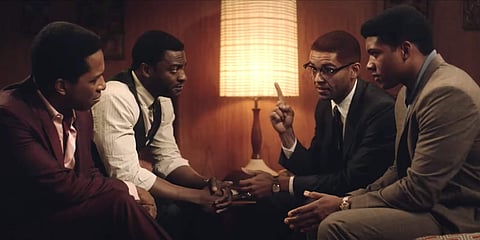

This is one strange f*cking night, says Aldis Hodge's NFL hero Jim Brown near the end of Regina King's One Night in Miami. The night in question is February 25, 1964. Muhammad Ali (Eli Goree) — still known as Cassius Clay at the time — has just become the new world heavyweight champion. To celebrate, his friend and mentor Malcolm X (Kingsley Ben-Adir) hosts a get together for Cassius, Jim, and 'King of Soul' Sam Cooke (Leslie Odom Jr) at his hotel room in Hampton House. They are four of the most powerful and influential black men of the time — a time when black people in the US had begun fighting for their rights. As Cassius puts it, they are "young, black, righteous, famous, unapologetic." They are also friends.
The meeting really did happen, but One Night in Miami is a fictional imagining of what might have taken place then. The film is adapted by Kemp Powers from his one-act play of the same name. While its origin is evident and the film does play out like a chamber drama, full credit to Regina King for keeping it from feeling claustrophobic. King and Powers add a prologue of sorts, showing us the four men going through difficult times a year before the night in question, during which we travel from Wembley to Copacabana to St. Simons Island in Georgia to Malcolm's home in New York, and an epilogue that culminates in Sam singing his A Change Is Gonna Come on The Tonight Show. However, the majority of the film is set inside that one hotel room, with brief excursions to the rooftop, a liquor store, or a phone booth. King's filmmaking skills — in her directorial debut, no less — are on full display in the way she blocks the scenes inside the hotel room, making good use of the space and fixtures in it and ensuring constant movement of the actors and/or the camera.
Another issue that films adapted from plays often have is a certain unnaturalness in the dialogues. There's hardly any of that here. Powers' dialogues and the performances of the four leading men lend such a lovely air of verisimilitude to the proceedings. We totally buy the camaraderie of these men and see them as more than just the icons they've come to be known as. One Night in Miami is all about showing us the humanity of these heroes, and the vulnerability — be it the cocky Cassius getting cold feet over his decision to become a Muslim or Sam's defensiveness when Malcolm confronts him about not doing enough for the cause of the black liberation movement. But most of all, it is Malcolm's nervousness about his decision to leave the Nation of Islam and consequent "foreboding of death" as he puts it, that permeates the film. Especially since we know he was assassinated less than a year after that night. It adds another layer to the urgency of his pleas — nay, demands — to his friends to do all they can for the cause. At one point, he calls them the "greatest weapons" they have, but Jim is quick to retort that they're nobody's weapons. This difference is at the root of conflict that blows up between Sam and Malcolm, with the latter expecting Sam to do way more with the voice he has.
While this conflict between Sam and Malcolm drives the plot, for the most part, we also see the individual equations that all these men share with each other. Malcolm and Cassius share a mentor-mentee relationship of sorts, but when Cassius feels Malcolm has crossed a line while berating Sam, he has no qualms about calling Malcolm out for it. Jim is the one that both Malcolm and Sam open up to, while Jim himself reveals to Cassius a secret that he doesn't share with the others. These interactions go a long way towards making these historical figures relatable. And speaking of Jim, Aldis Hodge deserves a special shoutout for his excellent portrayal. All the actors are really good, but Hodge is a class apart here. It's no wonder that he gets several close-ups even when he has no lines. One particular sequence stands out where Jim walks off into the restroom while the others continue a heated discussion. The camera stays with Jim for a good while and then cuts back and forth between him and the others outside.
A little after the aforementioned sequence, Malcolm passionately declares that there's "no more room for anyone to be standing on the fence anymore!" It's one of the most powerful scenes in the film and a proclamation that rings eerily true in the here and now. The same line was ringing in my ears when Odom Jr's Speak Out played over the end credits. They say the personal is political, but One Night in Miami shows us that the political is also personal. And when Odom Jr sings, "Listen, listen," it feels like a personal plea... Will we listen?